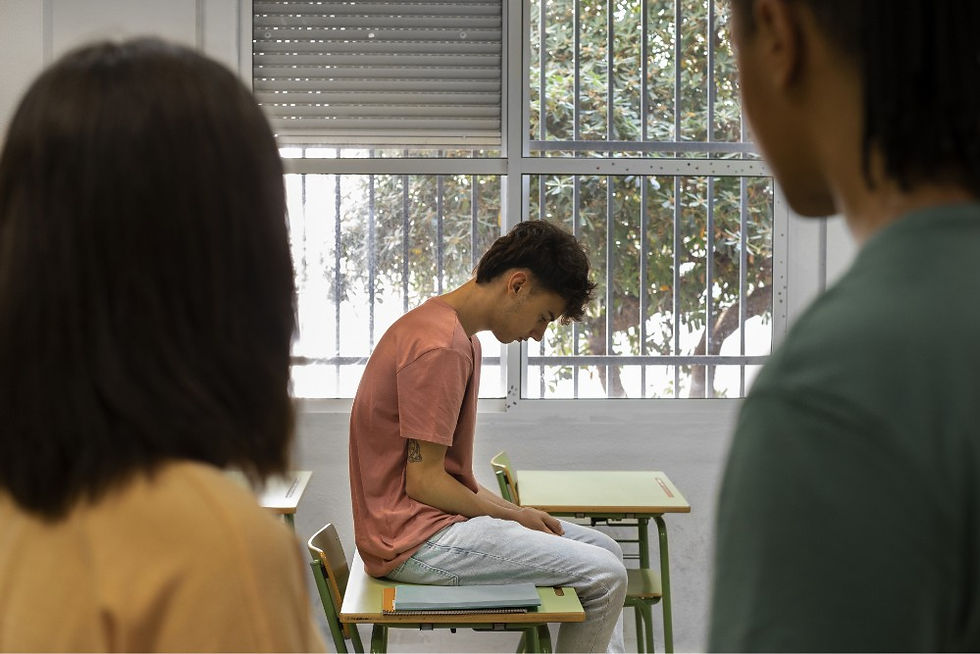How Can I Help My Teenager with Trauma? A Parent’s Guide
- SHINE Children and Youth Services

- Aug 14, 2025
- 6 min read

When your teenager experiences trauma, your response as a parent or caregiver can have a profound impact. Supportive, informed parenting not only promotes healing but can also help your teen develop resilience to cope and face future challenges.
The first step in learning how to support them is by understanding what trauma is, how it affects teens, and what signs to look out for, so you can offer the care and stability they need to recover.
Understanding Teenage Trauma: What Is a Traumatic Event?
A traumatic event refers to any experience that causes physical, emotional, psychological, or even spiritual harm. This could include events that make them feel deeply threatened, helpless, or extremely afraid, such as physical pain or injury, serious illness, or witnessing death.
After such experiences, teens may struggle to process what happened. Some may not fully understand their reactions, while others may deny that the event affected them at all. Regardless of how they respond, it’s important to recognise that recovery takes time, and they will need support to regain emotional and mental balance.
How Does Trauma Affect Teenagers?
If your teenager has gone through a traumatic event, it’s common for them to exhibit a mix of emotional, cognitive, behavioural, and physical signs.
Emotional Reactions:
Fear and anxiety
Shock or disbelief
Guilt or shame
Emotional numbness or emptiness
Distress when reminded of the event
Cognitive Reactions (Thoughts):
Repeatedly talking about the traumatic event, or avoiding the topic altogether
Intrusive memories or feeling like the event is happening again
Nightmares or unwanted flashbacks
Difficulty concentrating
Belief that the world is unsafe or that bad things will keep happening
Behavioural Changes:
Sleep disturbances
Appetite changes
Avoiding people, places, or activities that remind them of the trauma
No longer interested in the hobbies or activities they once enjoyed
Hypervigilance or being easily startled
Refusing to go to school
Irritability or anger outbursts
Withdrawing from friends and family
Physical (Bodily) Symptoms:
Stomach aches and headaches
Chest tightness or pain
Rapid heartbeat
Breathing difficulties
Muscle tension or feeling physically on edge
Cold sweats, trembling, or shaking
While many of these responses are temporary and may fade with time, it's important to monitor your teen’s well-being. If symptoms persist or worsen, consider seeking support from a mental health professional.
How Can I Help My Teenager with Trauma
Supporting a teenager struggling with trauma can be challenging. On top of the emotional turbulence that comes with adolescence, they must also process and recover from a distressing experience. As a parent, your understanding, patience, and consistent support can make a meaningful difference in their healing journey.
1. Keep Communication Open
Having a safe and supportive environment at home could help your teenager feel more comfortable expressing their thoughts and emotions. You can foster open communication by being approachable and available whenever they're ready to talk. Remind them that you're there to listen without judgment, and that your presence is a safe space for them to share.
Make it a habit to check in regularly. Instead of waiting for them to speak up, gently ask how they’re feeling and invite them to open up at their own pace. Even if they’re not ready to talk, simply knowing you care can make a big difference.
2. Help Them Regain Perspective
A traumatic event can shake your teenager’s sense of safety and control. Helping them understand what happened and process it in a constructive way can restore some stability.
These are some tips on how to support them in this process:
Support their need for information. Encourage them to learn about what happened from trustworthy sources, such as official government websites or credible news outlets.
Avoid overwhelming them. While honesty is important, skip unnecessary or graphic details that may increase anxiety. Strike a balance between being informative and being protective.
Balance the narrative. Help your teen understand that while terrible things happen, many people are working to make the world better. Share real examples of kindness, recovery, or community support.
Limit media exposure. Consider reducing your teen’s exposure to distressing news or social media content, especially if it’s repetitive or graphic.
3. Be Patient with Emotional Changes
Teenagers may respond to trauma in emotional or unpredictable ways. Mood swings, irritability, or withdrawal can all be signs of distress, not defiance.
Ways to support your teen through this phase:
Expect emotional ups and downs. Give them space and flexibility while they process their emotions.
Negotiate boundaries together. If your teen becomes more rebellious, it may be their way of trying to regain control. Collaborate on boundaries that give them some independence while maintaining structure.
Validating their emotions. Acknowledge that distress, sadness, anger, or grief are natural parts of healing. Expressing these feelings is part of the recovery process.
Respecting their emotional response. Even if their feelings or opinions don’t match yours, accept them without judgment.
Avoid escalating conflicts. If they express anger or blame, try to listen without arguing. These reactions are often rooted in pain and confusion.
4. Guide Your Teen in Rebuilding Confidence in Friendships and Social Settings
After experiencing trauma, teenagers may also struggle to relate to their peers in the same way. They might feel isolated, misunderstood, or overwhelmed by social situations that once felt normal. As a parent, you play an important role in helping them rebuild social confidence and maintain healthy friendships.
Some ways to support your teen include the following:
Acknowledge their social struggles. Let your teen know it’s completely normal to feel disconnected or uncertain after a traumatic experience. Reassure them that there’s no need to “bounce back” immediately and that healing takes time. Avoid forcing them into social situations too soon, and instead offer gentle encouragement based on their readiness.
Encourage quality over quantity. Rather than focusing on having many friends, help your teen prioritise relationships that feel safe and supportive. One or two trustworthy friends can offer more comfort than a large social circle. You can also guide them in recognising what a healthy friendship looks like—based on respect, understanding, and mutual support.
Connect them with support networks. Sometimes teens find it easier to talk with others who have gone through similar experiences. Explore youth-focused support groups, school counsellors, or mentorship programmes that provide a safe space for sharing and connecting. These resources can help your teen realise they’re not alone and provide them with tools to navigate social interactions with more confidence.
Let your teen take the lead in re-entering social life, but continue offering support and reassurance every step of the way.
5. Support Your Teen’s Academic Journey While They Heal
Academic challenges often follow emotional ones. Trauma can impact your teen’s concentration, memory, motivation, and ability to keep up with schoolwork. Supporting their school success requires both understanding and practical support. Some of the ways to support them:
Communicate with teachers and school staff. With your teen’s consent, inform relevant school personnel so they can offer flexibility and additional support when needed.
Adjust expectations. Be patient if grades slip or if your teen struggles to stay focused. Also, celebrate small wins and progress, not just academic performance.
Create a calm home environment. Establish a predictable daily routine that includes time for homework, rest, meals, and self-care. This helps reduce stress and gives your teen a sense of safety and control.
Most importantly, let your teen set the pace. Re-entering social life after trauma is a deeply personal journey. Be available, listen without judgment, and offer consistent reassurance that they’re loved and supported no matter where they are in the process.

When to Seek Professional Help
While some teens gradually recover from the effects of trauma with family support, others may need professional intervention. Seek youth counselling or mental health services if your teen shows these signs:
Engages in risky or self-destructive behaviour
Appears persistently withdrawn, anxious, or depressed
Shows no signs of improvement over weeks or months
Begins abusing substances or self-isolates
Stops communicating or acting in noticeably unusual ways
Early intervention can prevent long-term mental health challenges. Trust your instincts. If something feels wrong, it’s okay to reach out for help.
How SHINE Can Help Teens Dealing with the Mental Health Effects of Trauma
SHINE Children and Youth Services provides structured, compassionate support for teenagers navigating the mental health challenges caused by trauma. As a trusted charity for children and youth, we offer programmes that aim to help young people process their experiences and build emotional resilience.
Our services include:
Youth counselling to support emotional healing and behavioural regulation
Psychoeducation programmes to improve mental health literacy and teach practical self-help strategies
At SHINE, we believe in empowering every child and youth with the tools and support they need to recover, rebuild, and thrive.




It's so true that teens often struggle to process traumatic events, sometimes even denying their impact, as you rightly point out. This makes a parent's role in recognizing the more subtle signs even more crucial. The emotional numbness or denial you mention can be particularly challenging for parents trying to offer support, as it often masks the underlying need for healing. Navigating these complex emotional landscapes requires not just empathy, but also a clear understanding of what to look for, especially when direct communication is difficult. For parents seeking to better understand and identify these crucial indicators, exploring reliable resources for identifying trauma symptoms in teenagers can provide invaluable guidance.
Your article rightly highlights that understanding the nature of traumatic events and their impact is the crucial first step for parents supporting their teens. Recognizing the various forms trauma can take—physical, emotional, or psychological harm—empowers caregivers to look beyond surface behaviors and offer targeted support. For those seeking to gain deeper insight into potential past adverse experiences that might be influencing their teen's current struggles, resources like an Adverse Childhood Experiences (ACEs) assessment can be incredibly valuable.